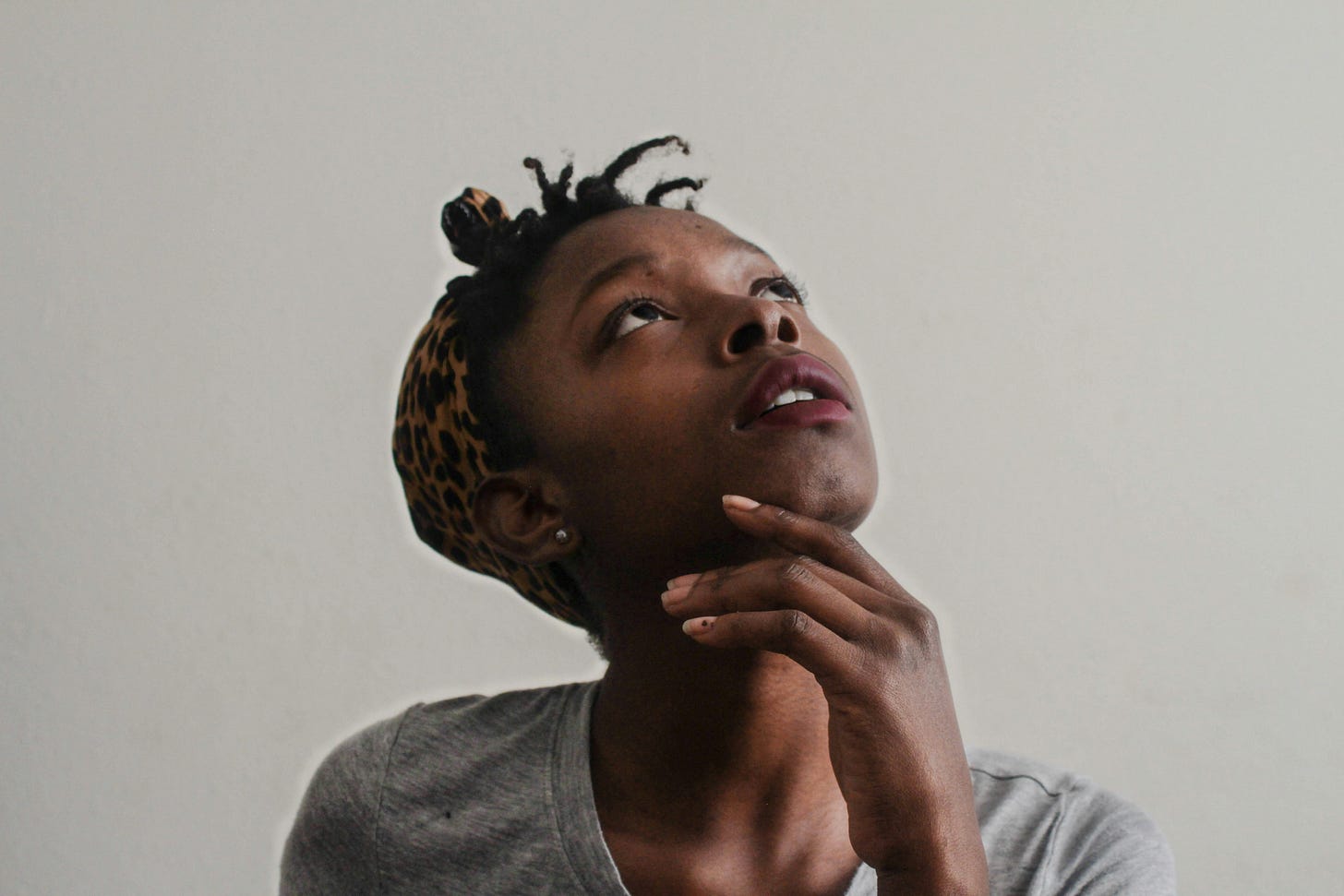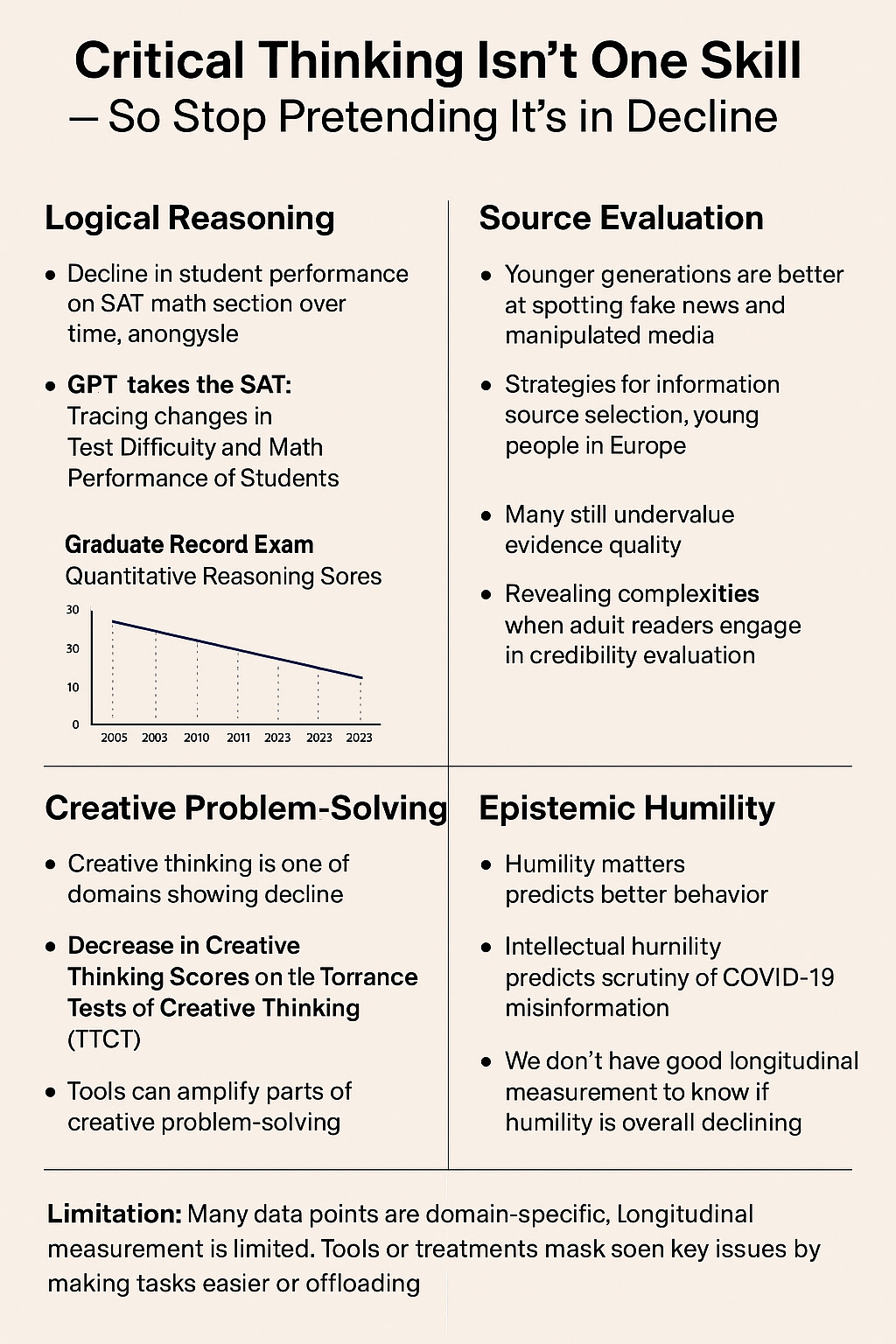The Hidden Truth About Critical Thinking That's Fooling Everyone
It's Not One Skill in Decline - It's Four Skills Going Different Directions
Photo by Tachina Lee on Unsplash
Professor Sarah Chen graded her final batch of research papers last Tuesday. Half her students failed to cite proper sources. They mixed up correlation with causation. They cherry-picked data to support weak arguments.
"Critical thinking is dead," she muttered, reaching for her red pen.
But here's what Sarah missed: Those same students had spent the previous week dissecting a viral TikTok video. They spotted deepfake tells. They traced misleading statistics back to their sources. They identified subtle bias in news coverage.
Sarah's students weren't bad thinkers. They were uneven thinkers.
Everyone keeps saying critical thinking is collapsing. Employers complain about workers who struggle with basic reasoning. Educators worry about students who believe everything they read online. Politicians blame social media for creating a generation of shallow thinkers.
But what if we're asking the wrong question? What if "critical thinking" isn't one skill at all?
The Four Domains of Critical Thinking
Critical thinking works more like a Swiss Army knife than a single blade. You need different tools for different jobs. Some tools stay sharp while others rust from neglect.
Research shows four distinct domains where our thinking splits:
Logical Reasoning: The Foundation Cracks
The data here tells a concerning story. SAT math performance has declined significantly from 2008 to 2023, even as the test itself became less challenging. Students scored worse on quantitative reasoning despite easier questions.
A study tracking 654 Chinese vocational students found critical thinking scores dropped by 0.056 points per semester during their first year. Study engagement fell alongside reasoning ability. When students check out mentally, their logical thinking follows.
But reasoning skills show remarkable stability when cultivated properly. Meta-analyses of cognitive abilities reveal that logical reasoning holds steady across time when students receive consistent practice and feedback.
The pattern emerges: logical reasoning declines when neglected but responds well to deliberate training.
Source Evaluation: The Surprising Bright Spot
Young people get unfair criticism here. A 2023 study across four European countries found that younger generations use sophisticated strategies to evaluate information sources. They triangulate multiple sources. They check author credentials. They apply both cognitive and emotional criteria when assessing credibility.
The twist? They outperform older adults at spotting fake news and manipulated media.
The problem isn't that young people accept everything they read. The problem is a domain-specific weakness. When evaluating health information on social media, people of all ages prioritize source expertise and prior beliefs over evidence quality. Even educated adults fall into this trap.
Source evaluation skills are improving in some areas while stagnating in others. The skill set is uneven, not uniformly weak.
Creative Problem-Solving: Tools Versus Thinking
This domain shows the starkest decline. Torrance Tests of Creative Thinking scores dropped significantly from 1984 to 2008 across multiple age groups. Creative thinking faces real erosion.
But the picture gets complicated when you add technology. Students using ChatGPT produced more original and elaborate solutions in creative problem-solving tasks. They reported higher confidence and self-efficacy.
The catch? Their perceived effort dropped. Their ability to self-evaluate weakened. Tools amplified their output while potentially undermining internal skill development.
Creative problem-solving splits into two paths: raw creative ability (declining) and tool-assisted creativity (rising but risky).
Epistemic Humility: Knowing What You Don't Know
This domain matters most for navigating uncertainty. People with higher intellectual humility engage more in fact-checking when they encounter misinformation. They seek alternative opinions. They admit when evidence challenges their beliefs.
Three studies involving over 1,200 people confirmed this pattern during COVID-19 misinformation. Humble thinkers performed better at distinguishing true from false information.
But we lack longitudinal data to track whether humility is declining over time. The research shows humility predicts better thinking outcomes without revealing broader cultural trends.
The Real Problem: Imbalanced Thinking
Critical thinking hasn't disappeared. It has fractured.
Students excel at spotting bias in news articles but fail at evaluating research methodology. Workers brainstorm innovative solutions but don't question faulty assumptions in project briefs. Social media users fact-check viral claims but believe health misinformation from trusted friends.
We've created environments that sharpen some thinking tools while dulling others. Social media trains rapid pattern recognition but discourages deep reflection. Search engines make information abundant while reducing our tolerance for uncertainty. Collaborative tools enable creative ideation but don't teach rigorous evaluation.
The "decline" narrative misses this nuance. Some thinking skills are improving. Others are deteriorating. Most are simply shifting to match new environments.
Building Balanced Thinking Skills
Stop treating critical thinking as a single muscle to strengthen. Start training specific thinking tools for specific situations.
Audit your thinking toolkit. Track which domains you use daily. Most people overuse familiar tools while avoiding uncomfortable ones. If you're great at creative brainstorming but terrible at source evaluation, you've found your weak spot.
Practice by domain. Logical reasoning improves through structured problem-solving. Try logic puzzles, statistical reasoning exercises, or formal debate preparation. Source evaluation gets better when you deliberately trace claims back to original sources. Creative problem-solving benefits from constraints and time pressure. Epistemic humility grows when you actively seek disconfirming evidence for your beliefs.
Design better environments. Individual skill-building isn't enough. Create systems that reward reflection, not just speed. Build "devil's advocate" reviews into team processes. Add cooling-off periods between brainstorming and decision-making. Separate idea generation from idea evaluation.
Embrace uneven progress. Some thinking domains will always lag others. The goal isn't perfect balance but strategic awareness. Know when you're using your strong tools and when you need to compensate for weak ones.
Critical thinking education fails when it treats all reasoning as equivalent. A student who struggles with formal logic might excel at identifying emotional manipulation in advertising. A worker who generates brilliant creative solutions might need help with systematic evaluation processes.
Train the toolkit, not just the mind.
The Real Risk We Face
Critical thinking hasn't collapsed. We've simply specialized our thinking in response to new information environments. The real risk isn't that we've lost the ability to think clearly.
The real risk is that we keep pretending all thinking skills rise and fall together.
This false assumption leads to misguided solutions. We blame technology for making us stupid when it's actually making us uneven. We design one-size-fits-all critical thinking courses when we need targeted skill development. We panic about general cognitive decline when we should be addressing specific thinking imbalances.
Until we stop chasing the myth of a single "critical thinking skill," we'll keep misdiagnosing the problem and missing the solutions.
The future belongs to people who think strategically about thinking itself. Not better thinkers, but more balanced ones.
Thanks for Reading
Buy Me A Coffee |Gumroad| Medium



